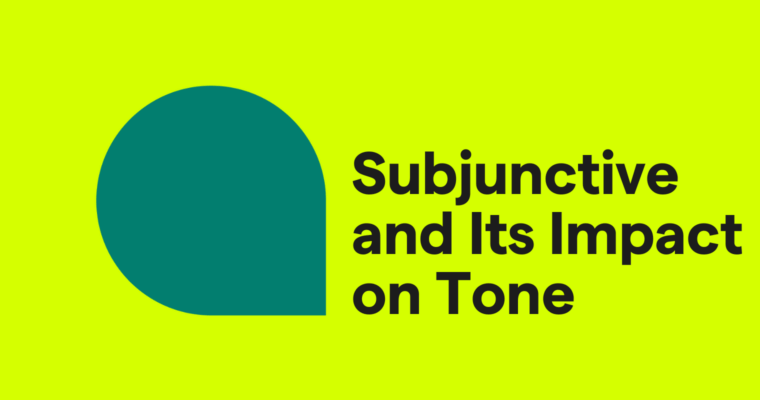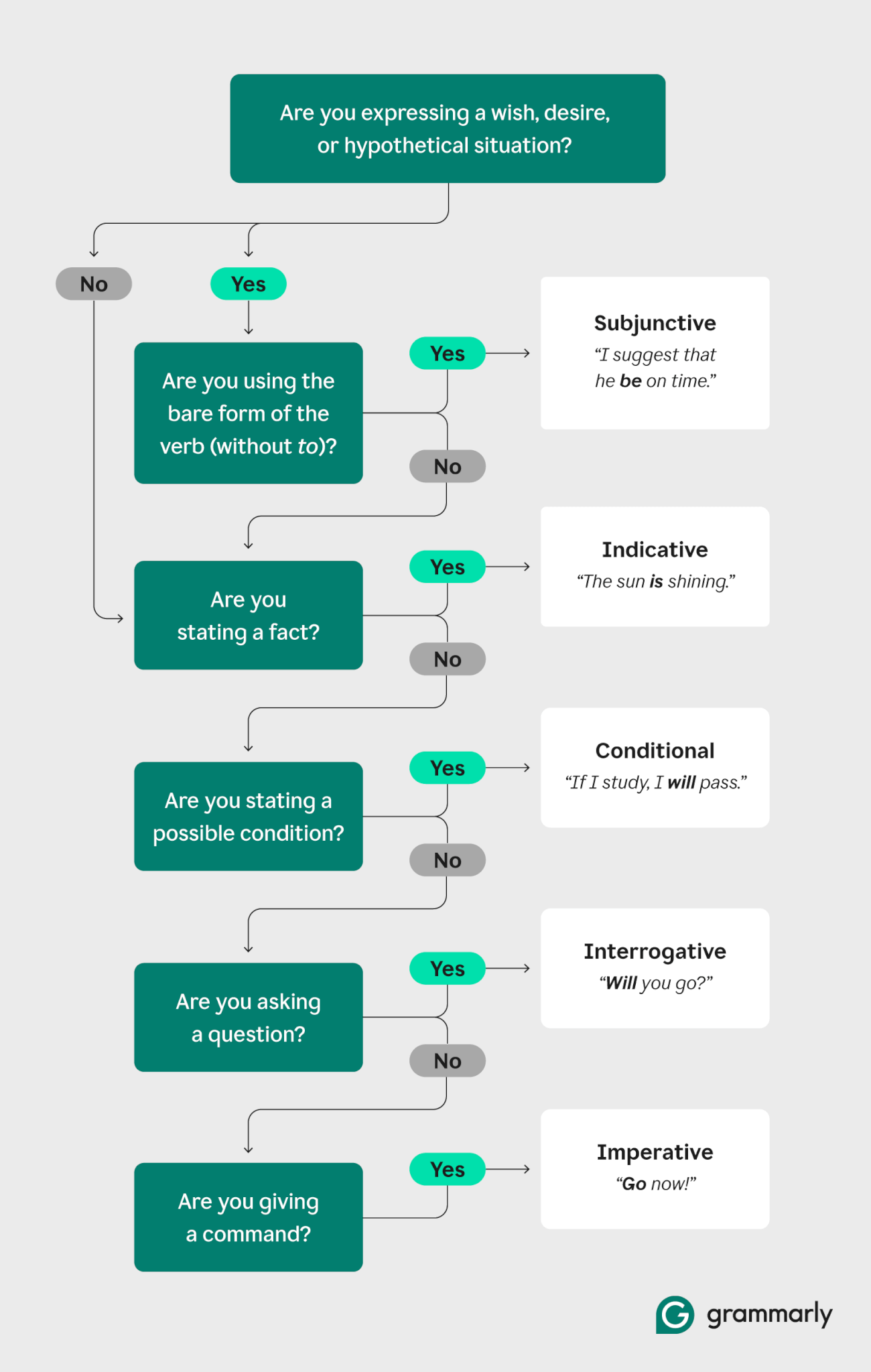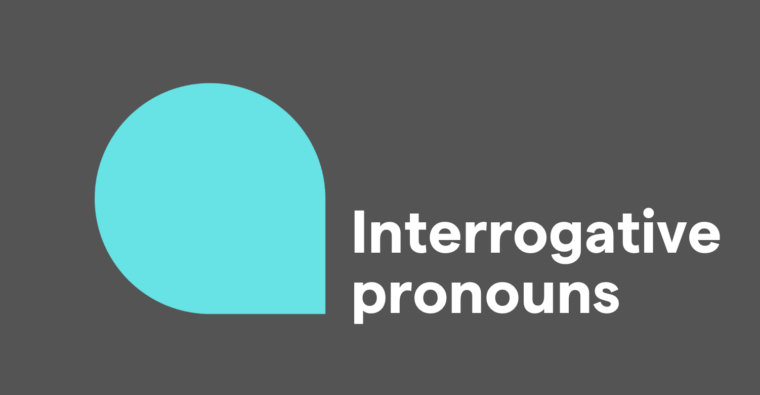
Key takeaways:
- The subjunctive mood expresses wishes, desires, and imagined scenarios. It functions as a verb mood and often appears with verbs like were or be.
- The sentences “I suggest that he be on time” and “If I were you, I’d take the job” are two examples of the subjunctive.
- The subjunctive mood is one of five major verb moods, which also include the indicative, conditional, interrogative, and imperative, and each serves a unique role in communication.
In writing, tone can carry just as much meaning as the words themselves. It can convey feelings, intentions, or even predictions about what might happen. This is where grammatical moods like the subjunctive come in.
The subjunctive mood allows you to express hypothetical situations and outcomes. If you’ve ever written something like “If I were …,” you’re already familiar with the subjunctive. In this post, we’ll explore what the subjunctive is, how it works, and how to use it effectively in your writing.
Table of contents
What is the subjunctive, and how does it work?
How to form the subjunctive mood
How to use the subjunctive compared to other moods
Using irregular verbs with the subjunctive
What is the subjunctive, and how does it work?
The subjunctive isn’t a tense; it’s a mood. It’s the wording you use when discussing things you want, hope for, or anticipate. Unlike some languages, English doesn’t have a specific subjunctive verb form.
Instead, the subjunctive is expressed by using the bare form of a verb in a finite clause. The verbs be or were are often used as linking verbs in subjunctive sentences.
Here are two examples of the subjunctive mood:
- If I won the lottery, I would rescue every stray cat.
- I asked that they rescue the cats that entered their property.
Many subjunctive sentences follow this sentence structure, but they can vary depending on context.
How to form the subjunctive mood
To form the subjective mood, the bare form of a verb is simply written in its infinitive form without to before it. In the examples above, the word rescue is in its bare form. Even in past or present tense, the verb stays unchanged.
The table below shows how this works in examples:
Subjunctive Mood Examples
| Example sentence | Subjunctive verb | Tense | Subjunctive mood? | Explanation |
| Our teacher suggested that we finish our work early. | finish | Present | Yes | Finish stays in its infinitive form in the subjunctive mood. |
| If the shop were like others in town, it would take credit cards. | were | Past | Yes | Were stays in the basic form, even though it refers to the past. |
| I hope it will snow tomorrow. | will snow | Future | No | Will snow is in the indicative mood because it expresses a future possibility, not a hypothetical or contrary-to- fact situation. |
| If it snows tomorrow, we can make a snowman. | it snows | Present | No | It snows is in the indicative mood because it describes a real possibility, not a hypothetical situation. |
As shown in these examples, the subjunctive verb remains in its basic form, no matter the tense, when you’re using the subjunctive mood.
Subjunctive tenses
Whether referring to the present or past, each subjunctive tense helps convey your intent more clearly in scenarios that aren’t concrete or real. Let’s look at how the present and past subjunctive tenses are used.
Present subjunctive
The present subjunctive uses the bare form of a verb to discuss a present or future hypothetical. Here are some examples, with the verbs in bare form bolded:
- The coach recommended that he stop playing soccer.
- Given the new map you just bought, I ask that we adjust our trip.
Past subjunctive
The past subjunctive refers to the mood used to describe things you wish were true or had hoped would happen. In these cases, we use the verb were instead of was, even though was is the simple past-tense form for singular subjects. This change signals that the statement is hypothetical or contrary to fact.
- I wish I were taller.
- If she were taller, she could go on all the rides.
How to use the subjunctive compared to other moods
In a sentence, the subjunctive can look like other moods, such as the conditional or imperative. Any time you use the subjunctive, remember that you’re conveying something that isn’t certain or real. If you are expressing a concrete outcome or scenario, your sentence isn’t in the subjunctive mood.
Let’s explore the different moods, including the subjunctive, to understand their unique purposes in communication.
Subjunctive
The subjunctive mood expresses desires, wishes, and hypotheticals. For example, “When I go on vacation, I hope I go surfing.” In this case, the subjunctive mood shows that you’re expressing a hypothetical scenario—the desire to surf on your vacation.
Indicative
The indicative mood communicates facts or things that are real. For example, “When I go on vacation, I will go surfing.” Here, the sentence is straightforward, stating a fact about your future vacation plans.
Conditional
Sentences in the conditional mood describe situations that are possible and likely to happen. For example, “If I go on vacation, I will go surfing.” The conditional mood expresses a probable outcome based on a specific condition. While if is the most common way to introduce a condition, other words and structures can also form conditional sentences. For example:
- Unless you study, you won’t pass the test.
- Should you need help, just ask.
Interrogative
Though similar to the conditional mood, interrogative sentences ask questions. These moods don’t have distinct word forms, meaning you don’t need special structures to create them. For example, “When I go on vacation, will I go surfing?” This question is asking about a possible future outcome.
Imperative
The imperative mood gives commands. For example, “When I go on vacation, take me surfing.” In this case, you’re directly commanding someone to take action.
The flowchart below shows how the subjunctive mood is used, compared to other grammatical moods, making it easier to understand when and how to use each one in everyday language.

Using irregular verbs with the subjunctive
As we mentioned above, the subjunctive mood uses the bare form of a verb in a finite, tenseless clause. This is true even with irregular verbs, though it’s important to note that when a subjunctive clause involves the verb to be, perhaps the most well-known irregular verb in English, it almost always uses it in either of these forms: be or were. Take a look at these examples:
- If she were accepted, she would major in chemistry.
- He’ll join the band on the condition that he be the backup singer.
Subjunctive sentences with multiple clauses
Sentences in the subjunctive mood also often, but not always, contain two or more clauses. A clause is a group of words that contains a subject and a verb. Independent clauses can stand on their own as sentences. Dependent clauses can’t.
Here are a few more examples of multi-clause subjunctive sentences, mapped out in table format, with the verbs in bare form in bold:
| Main clause | Dependent clause |
| I suggest | we leave. |
| He requests | that the team remain at home. |
| They demand | that work stop immediately. |
| She insists | we play video games. |
The power of the subjunctive
Understanding the subjunctive mood’s place in sentences illuminates the subtle ways we convey hopes and desires with grammar. By recognizing these nuances, we can improve the clarity of our written and spoken communication.
Grammarly: Your partner in improving grammar and more
Grammarly helps you identify mistakes and offers real-time suggestions to refine your grammar, clarity, and more. With Grammarly’s real-time feedback, you can be confident in the quality of your written work.
Subjunctive FAQs
To help you better understand the subjunctive, we’ve answered some of the most commonly asked questions about its usage.
How do you know if something is subjunctive?
The subjunctive mood can be recognized by phrases like “if I were … ” or “I suggest he go.” Look for that clauses after verbs of suggestion or demand, where the verb often stays in its base form (e.g., go instead of goes). If clauses that express wishes or falsehoods also often use the subjunctive.
Certain fixed phrases, like “be that as it may,” always use the subjunctive. Finally, the subjunctive generally avoids typical verb changes, and the overall sentence context—particularly if it conveys doubt or possibility—can signal its presence.
When do you use the subjunctive?
Use the subjunctive mood when describing something that you want to happen, hope will happen, or anticipate or imagine will happen.
What are some examples of the subjunctive?
- If I were you, I would take the job.
- If I were a boy …
- It is crucial that she arrive on time.






